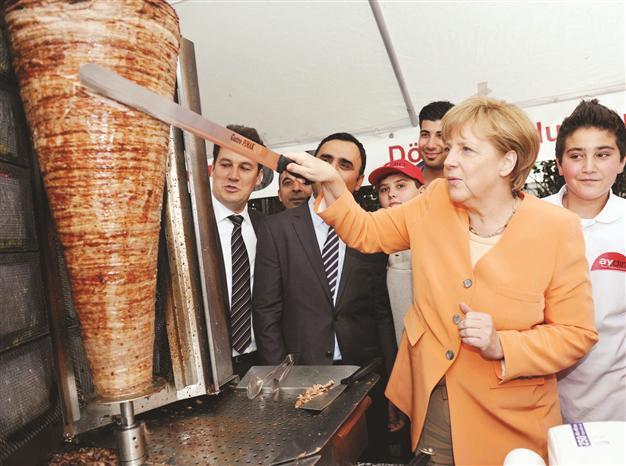Merkel isolated but firm before crucial EU summit
BERLIN - Agence France-Presse

German Chancellor Angela Merkel is seen cutting döner kebab, a traditional Turkish food, during a festival held by small businesses in Berlin on the evening of June 25. AA photo
German Chancellor Angela Merkel is increasingly isolated ahead of today’s last-gasp EU summit to save the euro, analysts say, but she seems unlikely to bend and has already won concessions on key issues.Under fire from all sides both within Europe and from the likes of China and the United States, Merkel has refused to yield to demands for pooling eurozone debt in the shape of eurobonds or allowing bailout funds to help stricken banks.
In the run-up to the summit, she even appeared to harden her line, dismissing eurobonds as “economically wrong and counterproductive” and saying she was “worried” there was too much talk of putting eurozone debt in one pot.
Berlin is unwilling to consider what Merkel termed “easy” solutions to the debt crisis -- such as eurobonds -- that it believes do not strike at the heart of the problem: lax fiscal discipline and insufficiently centralized EU control.
Guarantees and controls
Merkel has reiterated that the answer to the crisis is “more Europe, not less Europe” and wants to see member states ceding sovereignty to Brussels. “Guarantees and controls must go together,” she has frequently insisted.
But jittery financial markets want to see short-term answers as country after country finds itself under the EU’s safety net and concerns grow that there are not enough lifeboats to go around.
Jennifer McKeown, an analyst at Capital Economics, said: “Germany is opposed to joint funding of government borrowing or bank recapitalization unless it has control of other countries’ fiscal and banking policies.” “Meanwhile, France and Italy favor rapid moves to provide financial aid and are unwilling to relinquish sovereignty to Germany.
“Unless either Germany or the Franco-Italian camp has a dramatic and uncharacteristic change of heart, hopes that this week will bring a solution to keep the union together in its current form are likely to be disappointed.”
Carsten Brzeski, economist at ING bank in Brussels, said Berlin would not sign up to anything that looks like a pooling of debt until there is more of a fiscal and political union among at least the countries that share the euro.
“Any kind of collectivization seems to be like a red rag to a bull to the German government. It does not look as if the German government would change this position easily.
“This does not mean that the government is not committed and determined to save the eurozone. It is. The German government simply sticks to its principle of strict conditionality,” said the analyst.
Constitutional court option
Another economist, Holger Schmieding from Berenberg Bank, pointed to another constraint on Merkel -- the German constitutional court that has shown itself increasingly wary of transferring more powers to Brussels.
“Genuine eurobonds are not compatible with the German constitution in our view,” he said.
“Those who harbor hopes that Merkel could agree to eurobonds or a debt redemption fund may want to have a word with Germany’s constitutional court.”
















